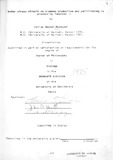| dc.contributor.author | Nyabundi, J O | |
| dc.date.accessioned | 2013-05-15T08:37:00Z | |
| dc.date.available | 2013-05-15T08:37:00Z | |
| dc.date.issued | 1985 | |
| dc.identifier.citation | Doctor of PhIlosophy In Ecology | en |
| dc.identifier.uri | http://erepository.uonbi.ac.ke:8080/xmlui/handle/123456789/23012 | |
| dc.description.abstract | Experiments were conducted at the University of
California, Davis field station. Soils were deep silty loam
with high water storage capacity. water stress effects on
vegetative and reproductive growth, canopy light conversion
efficiency and single leaf photosynthesis of tomato,
cultivar U.C. 82B were investigated under different
irrigation regimes. Irrigation treatments were: well
irrigated (I) and non-irrigated (NI). Treatment NI received
no more irrigation after the sixth leaf stage and thus
depended largely on water stored in the soil.
There was little or no difference in leaf water
potential between I and NI through most of the season.
Single leaf photosynthetic rate also showed little response
to irrigation treatments. However, withholding irrigation
caused marked depression on canopy expansion. Non-irrigated
plots had much smaller canopies and the resulting incomplete
ground cover greatly reduced biomass accumulation. A linear
relationship was found between cummulative intercepted
radiation and biomass accumulation. The slope of this line
is an expression of canopy photosynthetic efficiency. water
stress reduced this parameter but this effect was much less
than the reduction of canopy expansion suggesting that water
stress depressed biomass accumulation largely through its
effects in inhibiting canopy growth rather than canopy
photosynthetic efficiency.
Generally
water stress depressed vegetative growth but
enhanced or had no effect on reproductive growth. Water
stressed plants had higher fruit set on early flower
trusses. They al so had higher coeff icient of biomas s
partitioning into fruits through most of the season but the
duration of biomass accumulation into fruits was reduced.
Prevention of fruit development by continuous flower removal
failed to stimulate canopy growth in water stressed plants
suggesting that the preferential partitioning of biomass
into fruits may not be explained by simple competition for
assimilates.
Due to depression of canopy expansion, water
stressed plants may be limited by vegetative sinks and this
could ultimately lead to photosynthetic inhibition. Removal
of all fruits depressed photosynthesis presumably through
sink limitation and the mechanism involved was apparently
similar to that reported for water stress limitation on
photosynthesis. It is thus suggested that effect of water
stress on photosynthesis could be operating through sink
limitation. | en |
| dc.language.iso | en | en |
| dc.publisher | University of Nairobi | en |
| dc.title | Water stress effects on biomass production and partitioning In processing tomatoes | en |
| dc.type | Thesis | en |
| local.publisher | GRADUATE DIVISION of the UniversIty of CalifornIa | en |

